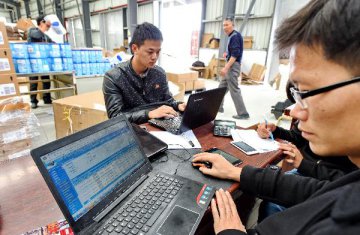Small and medium-sized enterprises (SMEs) in China are welcoming and capitalizing on the e-commerce boom to restructure the way of doing business.
"The Internet should empower SMEs in the industrial chain," said Jack Ma, chairman of China's e-commerce giant Alibaba at a meeting in Hangzhou Tuesday.
Besides being a platform for millions of buyers and sellers, Alibaba has initiated a Tao Factory program to pair up business partners.
Tao Factory has amassed 10,000 factories and promoted custom designs. Most of factories are based in manufacturing strongholds such as Guangdong, Zhejiang and Fujian provinces, said Yuan Wei, head of Tao Factory.
Factories put up details of products online, including size, technological standard, quality and samples. They also register details that attest to their credit.
"Tao Factory focuses on improving efficiency on the production side, through partnering up Internet sellers and SMEs," said Yuan.
Chuansheng Knitting Co. Ltd, based in Dongguan, Guangdong Province, used to churn out sweaters and other garments. Now about 80 percent of their business comes from online sellers.
"Under the traditional mode, it took us a long time to get payment, which frequently affected our capital chain," said manager Li Bing. "Now we cater our production according to different clients and different orders," he said.
Most of the orders are not large volumes, Li said, but clients require goods to be ready in a short period of time, and profits are usually very high.
"We recently had an order of 100 pieces, and they had to be ready in a week. The profit per piece was 2,000 yuan (295 U.S. dollars)," said Li.
Tao Factory works well for traditional manufacturers like the garment industry, Yuan said.
"Factories may have large inventory, but on the other side, certain demands are really high. Based on big data, demand in a certain period of time can be calculated, and we can give advice to buyers and sellers. We also offer information on designers and raw materials for the factories," said Yuan.
"Integrating online and offline business is the future," he said.
Guangzhou Blue Leaves Garment Factory used to supply for wholesalers in nearby cities.
"A few years back, our salesmen had to go door to door to get orders, now everything relies on the Internet. We even have orders from foreign buyers now," said manager Jiang Zaijian.
Online sales of consumer goods in China soared 26.2 percent from the previous year to 5.16 trillion yuan in 2016.
China's Ministry of Commerce has forecast strong growth in consumption this year with deepening supply-side structural reform.



















Latest comments